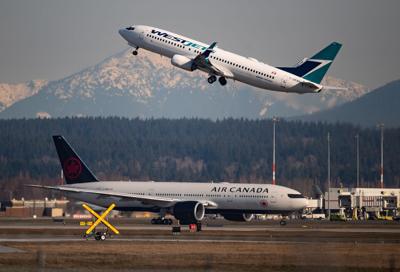The Competition Bureau of Canada has done its job in trying to increase affordability of passenger air travel.
But will the Carney government do its job by implementing the bureauÔÇÖs recommendations and a few reforms of its own?
The odds are against it. Ottawa for decades has protected CanadaÔÇÖs airline duopoly and has failed in efforts to nurture homegrown startups.
Last week, the Competition Bureau advised Ottawa to allow foreign-owned airlines to fly domestic routes in Canada.
ÔÇťAdded competition brings benefits,ÔÇŁ said Anthony Durocher, the bureauÔÇÖs deputy commissioner of competition promotion.
ÔÇťWhen a new competitor enters a route, airfares drop by nine per cent,ÔÇŁ he said.
The bureau says loosened foreign ownership rules ÔÇťmay attract more foreign capital and expertise to increase competition.ÔÇŁ
Brad Callaghan, associate deputy commissioner of the bureauÔÇÖs policy, planning and advocacy directorate, said ÔÇťSheltering companies from competition does not create national champions. For trusted partner countries, Canada should relax its restrictions.ÔÇŁ
The bureau would remove the federal transport ministerÔÇÖs ability to ignore antitrust objections to airline mergers. The bureau objected to the three latest mergers, including the Air Canada-Transat combination ultimately blocked by European antitrust authorities.
The bureau also recommends scrapping restrictions that prevent smaller airports from providing international flights.
Increased competition among airports could reduce the high fees airports charge airlines, which pass through to higher ticket prices. 
Air Canada and WestJet together account for as much as 78 per cent of domestic air passenger traffic.
The duopolists have reduced flights in each otherÔÇÖs Eastern and Western strongholds to increase profitability.
That reduction in travellersÔÇÖ choices enables the airlines to charge higher fares on the newly limited number of routes and flights, while reducing service to several communities.
When the Competition Bureau last year launched the market analysis it released last week, then-industry minister Fran├žois-Philippe Champagne warned that the viability of the Canadian passenger air industry and ÔÇťCanadaÔÇÖs sovereigntyÔÇŁ were at stake with any radical reforms the bureau might propose.┬á┬á┬á
But sovereignty is a bogus issue.
The flagship airlines of Spain (Iberia) and Ireland (Aer Lingus) have long been owned by British Airways parent International Airlines Group (IAG).
The Dutch flagship carrier KLM merged with Air France 22 years ago. SwitzerlandÔÇÖs national airline, Swiss International Air Lines, is owned by GermanyÔÇÖs Deutsche Lufthansa.
And Australia and New Zealand allow 100 per cent foreign ownership of airlines flying domestic routes.
That anyone can tell, foreign ownership has not diminished the sovereignty of countries where foreign enterprises own major airlines.
Which might account for the yawns that greeted the May announcement that Delta Air Lines and Korean Air are buying a combined 25 per cent stake in CalgaryÔÇÖs WestJet Airlines.
In the past two decades, more than 15 Canadian airlines have ceased operations, including Calgary-based discounter Lynx, which shut down last year. They were thinly capitalized and squeezed out of the market by the duopoly.
With their enormous stock-market valuations, Deutsche Lufthansa ($14 billion), Ryanair ($40 billion) and Delta ($43 billion) have the financial heft and economies of scale to hold their own in fare wars with the Canadian duopoly.
The incumbent airlines argue that foreign ownership of airlines flying domestic routes would put Canadian jobs at risk and jeopardize national security given the airlinesÔÇÖ strategic importance in natural disaster relief and national defence.
ThatÔÇÖs been the incumbentsÔÇÖ argument for years. But it doesnÔÇÖt hold up against the European experience, in which proud countries like Spain, the Netherlands and Switzerland are content with foreign-owned companies dominating their domestic air travel.┬á
Ottawa could require minimum Canadian employment levels at the foreign-owned carriers operating here and cap their routes and flights until Air Canada and WestJet close the competitiveness gap between them and foreign-owned airlines.
Still, if Ottawa canÔÇÖt abide a foreign role in achieving greater affordability in air travel, it could at least encourage more competition among airports.
Travellers indirectly pay the steep departure and landing fees that airports charge airlines, which also pay high rents for access to airport gates.
In a recent speech, the CEO of WestJet Airlines, Alexis von Hoensbroech, said that sales taxes and airport and other fees account for about $133 of every ticket price in Canada and just $49 in the U.S.
Reducing those costs, WestJet claims, would ÔÇťstimulate enough new demand to support a new airline of comparable size to WestJet.ÔÇŁ
Shrinking those costs would also better enable startup airlines to thrive. The costs make up a bigger share of expenses for small airlines than large ones.
And the cost reduction would help remedy CanadaÔÇÖs laggard rate of productivity growth, once the country is no longer hobbled by an inefficient passenger air travel system.
Could it be that governments in Europe and Australasia are less parochial than Ottawa?
WeÔÇÖll have our answer when Carney says yes to Ryanair, Lufthansa or Delta offering flights from Vancouver to Halifax.



























To join the conversation set a first and last name in your user profile.
Sign in or register for free to join the Conversation